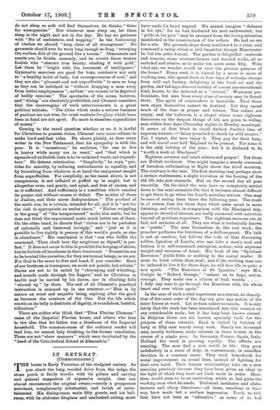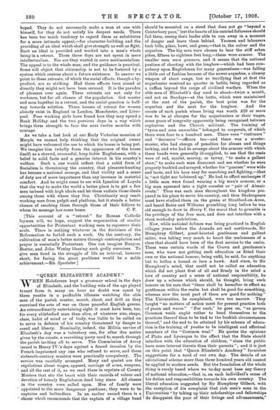T EE house is Early Victorian of the stodgiest variety. As
you climb the long, wooded drive from the lodge, the stone porch is fairly terrific with its pillars and carving and general suggestion of expensive weight. One can almost reconstruct the original owner,—surely a prosperous merchant, complacently substantial, and lavish of enter- tainment. His dining-room seats fifty guests, and his ball- room, with its alabaster fireplace and unabashed ceiling, must have made his heart expand. We cannot imagine "defiance in his eye," for he had feathered his nest unthwarted; but "pride in his port" may be assumed from the loving attention manifested in the construction of the cellars. He had an eye for.a site. His grounds slope down southward to a river, and command a valley which is still beautiful, though Manchester be but ten miles distant. The garden is delightful : orchards and rosaries, stone summer-houses and wooded walks, all so secluded and elusive as to make ten acres seem fifty. With what eye, we wonder, would he view the present purpose of the house ? Every week it is visited by a score or more of working men, who spend three or four days of welcome change from mill and factory, delighting in the fresh air and the garden, and taking a discreet holiday of a most unconventional kind, known to the initiated as a "retreat." Workmen pre- dominate, but men from every class of society may be found there. The spirit of camaraderie is incredible. That these men enjoy themselves cannot be doubted. Yet they spend much of the time in prayer and silence. The cellars are empty, and the ballroom is a chapel where some eighteen discourses on the deepest things of life are given to willing ears within four days (Thursday nights to Monday mornings). It seems at first blush to recall Sydney Smith's idea of supreme torture,—" being preached to death by wild curates." Yet, I repeat, the men enjoy it. They pay for their keep, and will travel over half England to be present. For some it is the only holiday of the year ; but it is declared to be "worth a week at Blackpool."
Eighteen sermons and much silence and prayer! Yet these are British workmen. One might imagine a steady crescendo of boredom, culminating in flight about the third morning. The contrary is the case. The first morning may perhaps show a certain restlessness, a slight irritation at the forcing of the old life into new channels. But on the second day all goes smoothly. On the third the men have so completely settled down to the semi-monastic life that it becomes almost difficult to get them to go when the fourth morning arrives. One may be sure of seeing them there the following year. The truth is, of course, that the three days which seem spent in mere listening, and which, in comparison with the Blackpool trip, appear so devoid of interest, are really crammed with activities beyond all previous experience. The eighteen sermons are, in fact, not sermons at all. They are what is technically known as "points." The men themselves do the real work ; the preacher performs the functions of a drill-sergeant. His talk is not at random, but follows the code of that discerning soldier, Ignatius of Loyola, who can take a man's soul and fashion it to self-command, enterprise, ardour, with supreme insight and sureness of touch. His book of the "Spiritual Exercises" yields little or nothing to the casual reader. It must be lived rather than read ; and if the working man can be induced to live it for three days, he will face life in quite a new spirit. "The Exercises of St. Ignatius," says Mrs. Craigie • in "Robert Orange," "exhort us to hope, action,
courage. They make one a citizen of both worlds I defy any man to go through the Exercises with his whole heart and ever whine again."
In the case of such a vital experience as a retreat, no descrip- tion of the mere order of the day can give any notion of the inner forces at work. Let us turn rather to results. It is only lately that the work has been introduced into this country on any considerable scale; but it has long been known abroad. In Belgium there are six houses, specially built for the purpose of these retreats. Each is visited by batches of forty or fifty men nearly every week. Nearly ten thousand men, mostly workmen, make retreats in these houses in the course of a single year. In Germany, France, Spain, Italy, Holland the work is growing rapidly. The effects are amazing. The men find a new worth in life : they gain indefinitely in a sense of duty, in contentment, in unselfish devotion to a common cause. They work henceforth for social improvement on sound lines, instead of fighting for their own hand. Their human relationships take on a new meaning precisely because they have been given an ideal in the light of which they have set their souls in order. Here, then, would seem to be an institution which at last gives the working man what he needs. Technical institutes and clubs, lectures and cheap literature,—all these, excellent in their way, have made but a surface impression. Truth to tell, they have not been as " educative " as some of us bad
hoped. They do not necessarily make a man at one with 'himself, for they do not satisfy his deepest needs. There has been too much tendency to regard them as substitutes for a more intimate appeal,—for character-building and the providing of an ideal which shall give strength as well as light. Such an ideal is provided and worked into a man's whole being in a retreat. These three days are not spent in mere intellectualism. Nor are they wasted in mere sentimentalism. The appeal is to the whole man, and the guidance is practical. Some will object that citizenship is not to be fostered by a system which centres about a future existence. In answer we point to these retreats, of which the social effects, though a by- product, are so striking. Had those effects been aimed at directly they might not have been secured. It is the paradox - of pleasure over again. These retreats are not only for workmen, but for all classes of the population. Get master and man together in a retreat, and the social question is half- way towards solution. Three houses of retreat for women already exist in England in London, Manchester, and Liver- pool. Poor working girls have found bow they may spend a Bank Holiday and the two previous days in a way which brings them strength to face the next twelve months with courage.
As we take a last look at our Early Victorian mansion at • Marple we cannot help thinking that the original owner might have welcomed the use to which his house is being put. We imagine him (wholly from the appearance of the house itself) as a shrewd, successful, hospitable Englishman, with a ' belief in solid facts and a genuine interest in his country's • welfare. Such a one would reflect that a rabid form of - Socialism is threatening the country, that pleasure-hunting
• has become a national scourge, and that virility and a sense a duty are of more importance than any increase in material comfort. And he might come to see with Ignatius of Loyola that the way to make the world a better place is to get a few men imbued with high ideals and let them radiate those ideals among those with whom they live. Christianity may reach working men from pulpit and platform, but it stands a better
• chance of reaching them through those of their fellows to whom its message has come home. C. P.
[This account of a "retreat" for Roman Catholic laymen will, we hope, suggest the organisation of similar opportunities for Protestant working men to repossess their souls. There is nothing whatever in the doctrines of the Reformation to forbid such a work. On the contrary, the cultivation of man's better nature through contemplation and prayer is essentially Protestant. One can imagine Bunyan, Baxter, and John Wesley blessing such godly exercises. To give men tired in the struggle of life an interval, however short, for facing the great problems would be a noble
• achievement.—ED. Spectator.]















































 Previous page
Previous page